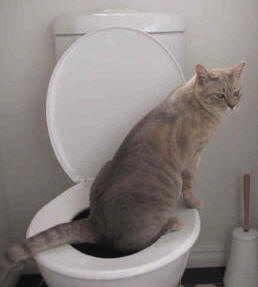The Dangers of Flushing Cat Poop Down Your Toilet - Advice for Better Disposal
The Dangers of Flushing Cat Poop Down Your Toilet - Advice for Better Disposal
Blog Article
The author is making a number of great points relating to How to Dispose of Cat Poop and Litter Without Plastic Bags as a whole in this post which follows.

Introduction
As feline owners, it's essential to be mindful of just how we get rid of our feline close friends' waste. While it may appear practical to flush cat poop down the commode, this method can have damaging consequences for both the setting and human health.
Alternatives to Flushing
The good news is, there are more secure and more liable methods to deal with feline poop. Think about the following alternatives:
1. Scoop and Dispose in Trash
One of the most common method of dealing with feline poop is to scoop it into an eco-friendly bag and throw it in the garbage. Make sure to utilize a dedicated litter scoop and dispose of the waste immediately.
2. Use Biodegradable Litter
Select biodegradable feline clutter made from materials such as corn or wheat. These trashes are eco-friendly and can be securely taken care of in the trash.
3. Hide in the Yard
If you have a backyard, think about burying cat waste in an assigned location far from veggie yards and water sources. Make certain to dig deep enough to prevent contamination of groundwater.
4. Install a Pet Waste Disposal System
Buy a family pet waste disposal system particularly developed for feline waste. These systems make use of enzymes to break down the waste, decreasing smell and ecological impact.
Health and wellness Risks
Along with environmental issues, flushing feline waste can additionally pose health and wellness dangers to people. Pet cat feces may contain Toxoplasma gondii, a bloodsucker that can cause toxoplasmosis-- a potentially serious ailment, specifically for expecting ladies and people with weakened immune systems.
Ecological Impact
Purging pet cat poop presents damaging microorganisms and parasites into the water, posturing a significant risk to aquatic ecological communities. These contaminants can adversely influence aquatic life and concession water top quality.
Verdict
Accountable pet dog possession prolongs past offering food and shelter-- it also involves correct waste monitoring. By avoiding purging feline poop down the toilet and choosing alternative disposal methods, we can minimize our environmental impact and protect human wellness.
Why You Should Never Flush Cat Poop Down the Toilet
A rose by any other name might smell as sweet, but not all poop is created equal. Toilets, and our sewage systems, are designed for human excrement, not animal waste. It might seem like it couldn’t hurt to toss cat feces into the loo, but it’s not a good idea to flush cat poop in the toilet.
First and foremost, assuming your cat uses a litter box, any waste is going to have litter on it. And even the smallest amount of litter can wreak havoc on plumbing.
Over time, small amounts build up, filling up your septic system. Most litter sold today is clumping; it is made from a type of clay that hardens when it gets wet. Ever tried to scrape old clumps from the bottom of a litter box? You know just how cement-hard it can get!
Now imagine just a small clump of that stuck in your pipes. A simple de-clogger like Drano isn’t going to cut it. And that means it’s going to cost you big time to fix it.
Parasitic Contamination
Believe it or not, your healthy kitty may be harboring a nasty parasite. Only cats excrete Toxoplasma in their feces. Yet it rarely causes serious health issues in the cats that are infected. Most people will be fine too if infected. Only pregnant women and people with compromised immune systems are at risk. (If you’ve ever heard how women who are expecting are excused from litter cleaning duty, Toxoplasma is why.)
But other animals may have a problem if infected with the parasite. And human water treatment systems aren’t designed to handle it. As a result, the systems don’t remove the parasite before discharging wastewater into local waterways. Fish, shellfish, and other marine life — otters in particular — are susceptible to toxoplasma. If exposed, most will end up with brain damage and many will die.
Depending on the species of fish, they may end up on someone’s fish hook and, ultimately on someone’s dinner plate. If that someone has a chronic illness, they’re at risk.
Skip the Toilet Training
We know there are folks out there who like to toilet train their cats. And we give them props, it takes a lot of work. But thanks to the toxoplasma, it’s not a good idea.

I was guided to that write-up about Don’t flush cat feces down the toilet from someone on another web page. Kindly take a moment to promote this blog entry if you enjoyed reading it. Thanks for taking the time to read it.
Set An Appointment Report this page